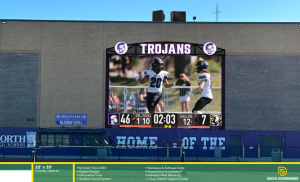Teen death leads to law about police questioning
October 18, 2019
When junior Corey Walgren was interrogated by school officials on May 26, 2017 at Naperville North about a reported video of a sexual encounter with a female classmate, he panicked. Walgren’s questioning by a school dean and a police officer occurred before his parents were notified of the allegations. When Walgren’s parents arrived at the school, Walgren had already left and jumped to his death off the roof of a parking garage.
House Bill 2627 was introduced by State Representative Stephanie Kifowit (D-84) shortly after this incident, and was signed on Aug. 23 by Governor Pritzker, and is now Public Act 101-0478. This act is an amendment to the Illinois School Code regarding “parental notification of law enforcement detainment and questioning on school grounds.”
The law mandates that before any student under 18 is detained or questioned by school law enforcement officers, resource officers or other security personnel about a criminal act, the school must attempt to notify the student’s parents or guardian.
In addition, the school must make reasonable efforts to ensure that the student’s parents or guardians are present during questioning. If a parent or guardian is unavailable then a school representative such as a counselor or school psychologist must be present. For students over 18, the act states that the student must be informed that they can request that a parent or guardian be present during questioning.
While the new law is meant to offer students a form of advocacy, it still allows school law enforcement to act in a timely manner if the situation requires immediate attention. Officers are allowed to make an arrest on school grounds and the laws of notification will not apply in circumstances of an urgent nature which would require immediate action.
The passage of Bill 2627 is a bittersweet victory for Walgren’s parents, Doug and Maureen Walgren, who started Corey’s Goal (www.coreysgoal.com) to raise awareness of the rights of minors in school.
Doug Walgren expressed his feelings about the passage of the bill in an Omega interview conducted via email, “I was very happy to see the bill get through the House and then the Senate and eventually be signed by the governor. But I was a little disappointed in some of the amendments that were made to the original draft.”
Continued efforts are being made by the Walgrens and Kifowit to bring attention to the matter and make sure issues are resolved appropriately.
“Raising awareness and ensuring that students are not in the same situation is the most important thing we can do,” Kifowit said, “We also included a training component so that Resource Officers can be trained on how to properly interact with students.”
While the bill’s passage made news across Illinois, some students are still not aware of their new rights. DGN counselor Katelyn Pantke acknowledges that the law is there to protect students, but that students tend to not be aware of their rights within the building.
“I I think that students don’t really know about their rights in general, so I would assume they don’t know about this new law.” said Pantke.
Walgren agrees with Pantke, and continues to make efforts to educate schools and students on their rights.
“Every parent and student needs to be aware that minors do not give up their constitutional rights when they enter school property or participate in a school sanctioned function,” Walgren said in the Omega interview. “However, they also need to be aware that the school administration is acting under the legal responsibility of ‘in loco parentis’ or in place of the parent.”
























